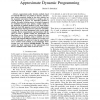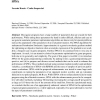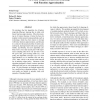27 search results - page 4 / 6 » Policy Gradient Method for Team Markov Games |
CDC
2010
IEEE
13 years 4 months ago
2010
IEEE
Approximate policy iteration methods based on temporal differences are popular in practice, and have been tested extensively, dating to the early nineties, but the associated conve...
IROS
2007
IEEE
14 years 4 months ago
2007
IEEE
— Multi-agent systems (MAS) are a field of study of growing interest in a variety of domains such as robotics or distributed controls. The article focuses on decentralized reinf...
ML
2006
ACM
13 years 9 months ago
2006
ACM
Most game programs have a large number of parameters that are crucial for their performance. While tuning these parameters by hand is rather difficult, efficient and easy to use ge...
ICML
2001
IEEE
14 years 10 months ago
2001
IEEE
We introduce the first algorithm for off-policy temporal-difference learning that is stable with linear function approximation. Off-policy learning is of interest because it forms...
GECCO
2009
Springer
13 years 7 months ago
2009
Springer
The covariance matrix adaptation evolution strategy (CMAES) has proven to be a powerful method for reinforcement learning (RL). Recently, the CMA-ES has been augmented with an ada...



